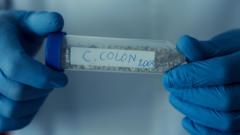For over 20 years, researchers have worked to uncover the true birthplace of Christopher Columbus through DNA analysis. In 2003, samples were taken from his supposed remains in Seville as well as from his son Hernando and brother Diego. This project, led by forensic scientist José Antonio Lorente and historian Marcial Castro, aims to resolve claims from regions in Spain, Portugal, and Italy, among others, that vie for Columbus's origins.
The widely accepted belief is that Columbus was born in Genoa, Italy, in 1451. However, various theories suggest origins from as far as Scotland to Hungary. Through DNA comparisons with historical figures and modern-day individuals believed to be related, researchers have narrowed down the list to eight plausible birthplaces, including Galicia and Mallorca in Spain.
As a prelude to a documentary scheduled for broadcast on Spain’s RTVE, the team confirmed the authenticity of the Seville remains as belonging to Columbus, notwithstanding potential remnants in the Dominican Republic. Final results that might revolutionize historical perspectives on Columbus are anticipated in November, although the documentary will provide substantial insights into his possible origins. Despite the debate, the Genovese theory remains prominent, with ongoing scientific analysis potentially altering Columbus's historical profile.
The widely accepted belief is that Columbus was born in Genoa, Italy, in 1451. However, various theories suggest origins from as far as Scotland to Hungary. Through DNA comparisons with historical figures and modern-day individuals believed to be related, researchers have narrowed down the list to eight plausible birthplaces, including Galicia and Mallorca in Spain.
As a prelude to a documentary scheduled for broadcast on Spain’s RTVE, the team confirmed the authenticity of the Seville remains as belonging to Columbus, notwithstanding potential remnants in the Dominican Republic. Final results that might revolutionize historical perspectives on Columbus are anticipated in November, although the documentary will provide substantial insights into his possible origins. Despite the debate, the Genovese theory remains prominent, with ongoing scientific analysis potentially altering Columbus's historical profile.





















